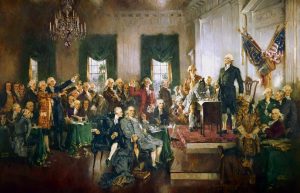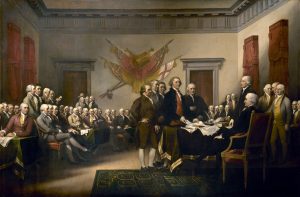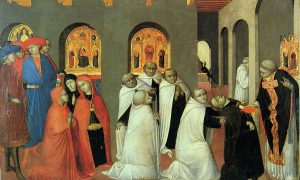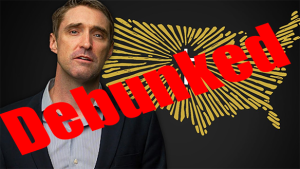“In those days there was no king in Israel. Everyone did what was right in his own eyes.” – Judges 21: 25
The belief that “taking control of the government can allow us to Christianize the culture” is among the most pervasive among Christian nationalists. Others may not dress it up in the language of spiritual warfare as the Dominionists do (learn more about that here), but it is nonetheless the fuel that drives people to Christian Nationalism as a political ideology. The question is, does this idea hold any weight? If the governing authority is in the hands of righteous believers, can a nation be molded and influenced into being a “Christian nation”?
The Cycle of Judges
The Judges ruled over Israel for a period of over four hundred years before Saul was anointed king. By looking more closely at the book of Judges, we can gain some insight into a more biblical view of Government and its relationship with the church. The book of Judges begins with Israel failing to uphold God’s commands; they do not complete the conquest of the promised land, deciding instead to enslave the Canaanites rather than drive them out completely. (Judges 1: 1 – 36) They also abandon God and begin to worship Baals and idols.
“So the anger of the Lord was kindled against Israel, and he gave them over to plunderers, who plundered them. And he sold them into the hands of their surrounding enemies so that they could no longer withstand their enemies.” (Judges 2:14 ESV)
So the Lord raised a righteous Judge named Othniel to act as a military leader and free the people of Israel from Oppression. Othniel freed the people from Cushan-rishathaim, the king of Mesopotamia, who had oppressed them for eight years. Once they are liberated, there is forty years of peace before Othniel dies. (Judge 3:7 – 11)
After Othniel’s death the people of Israel once again abandon God and are handed over to the Moabites. After 18 years of oppression, God sends Ehud, who assassinates the Moabite king and rallies Israel’s armies. Freeing God’s chosen people and bringing 80 years of peace (Judges 3:12-30).
After this, the people of Israel once again do evil in the eyes of the Lord. So the Lord gives them over to Jabin, the king of Canaan. Deborah is then raised up by the Lord to deliver the Israelites out from the hands of Jabin, and the Israelites have peace for forty years (Judges 4:1 -16, 5:1 -31).
You might be beginning to notice a pattern here in the book of Judges. The people turn away from God. God hands them over to their enemies, the people cry out, and a Judge rises up who saves the people, leading to a period of peace and prosperity. The people once again turn their backs on God, and the cycle repeats.
The Cart before The Horse
There are two things we can take away from this. First, God is sovereign. As we discuss the role and powers of authority, we must remember first and foremost that God is in control of all things. No one sits on any throne whom God did not place there. No crown is gained or lost except by God’s command.
“Let every person be subject to the governing authorities. For there is no authority except from God, and those that exist have been instituted by God.” (Romans 13:1)
Second, the book of Judges suggests that God chooses to give his authority to leaders who reflect the culture of the nation, not the other way around. When the kingdom of Israel is in defiance, God does not place righteous Judges over them to guide them back toward his light. Instead, God allows the people to continue in their sin until their suffering becomes so great that they cry out for him. It is only when the people look to God with fear and reverence that he sends them god fearing leaders to save them and bring them prosperity.
The Second Half of Judges
The book of Judges does not end with the cycle. Starting in Judges 17, we are given an account of the people’s struggle as some fall into depravity while others seek justice and to uphold the law. The result is some of the most graphic imagery in the bible as Idolatry (17:4 – 6), rape (19:22 – 28), and murder (20: 33 – 36) leads to genocide (20: 46 – 48), man-stealing (21: 20 – 24), and destruction.
“In those days Israel had no king; everyone did as they saw fit.” (Judges 21:25)
This is the final verse of The Book of Judges. Some have taught that this line is an admonishment against moral subjectivism as well as a call for more centralized government. The problem with this interpretation is that it contradicts events that occur later in scripture. Like in 1 Samuel when the people of Israel demand a king. God actually goes to great lengths to first warn people against a king before respecting their decision.
“But when they said, “Give us a king to lead us,” this displeased Samuel; so he prayed to the Lord. And the Lord told him: “Listen to all that the people are saying to you; it is not you they have rejected, but they have rejected me as their king. As they have done from the day I brought them up out of Egypt until this day, forsaking me and serving other gods, so they are doing to you. Now listen to them; but warn them solemnly and let them know what the king who will reign over them will claim as his rights.”” (1 Samuel 8:6 – 9).
The role of Earthly authority.
If we are to properly understand the meaning and themes of the book of Judges, we must look elsewhere in scripture. We see the authors of scripture refer to types of authority:
- Earthly Authority: This is the authority that has been given to the kingdoms and the nations.
- Divine Authority: This is the authority that rests solely in the hands of God.
Scripture makes it clear that the role of the Earthly authorities is one of Justice and Welfare. Those whom God has given power over us are responsible for disciplining sinners, protecting the innocent, and seeing to the prosperity of their “kingdom,” whatever form that takes.
“Consequently, whoever rebels against the authority is rebelling against what God has instituted, and those who do so will bring judgment on themselves. For rulers hold no terror for those who do right, but for those who do wrong. Do you want to be free from fear of the one in authority? Then do what is right and you will be commended. For the one in authority is God’s servant for your good. But if you do wrong, be afraid, for rulers do not bear the sword for no reason. They are God’s servants, agents of wrath to bring punishment on the wrongdoer. Therefore, it is necessary to submit to the authorities, not only because of possible punishment but also as a matter of conscience.” (Romans 13:2 – 5)
“Submit yourselves for the Lord’s sake to every human authority: whether to the emperor, as the supreme authority, or to governors, who are sent by him to punish those who do wrong and to commend those who do right.” (1 Peter 2:13 – 17)
What Earthly Authorities Cant Do
Earthly authority has limitations however. The earthly authorities can not dictate how the people worship, they can not force you to sin or otherwise act Ungodly, and lastly, the earthly authorities do not have the power to transform that which is evil into that which is good. This power belongs to God and God alone.
To better understand all of this, we need to look back at the Levitical Law. The Law is divinely inspired but is still an earthly authority. It disciplines the wicked (Leviticus 20:1-27), protects the innocent (Deuteronomy 19:15), and oversees the welfare of the nation of Israel (Exodus 22:25). Scripture makes it clear however, that The Law does not have the power to transform evil into good. “The Law made nothing perfect” (Hebrews 7:19).
“know that a person is not justified by the works of the law, but by faith in Jesus Christ. So we, too, have put our faith in Christ Jesus that we may be justified by faith in Christ and not by the works of the law, because by the works of the law no one will be justified.” (Galatians 2:16)
Who Has This Power?
We also must look at Christ. Jesus is clear in his teachings that sin is not a matter of actions but also a matter of the heart. “But what comes out of the mouth proceeds from the heart, and this defiles a person. For out of the heart come evil thoughts, murder, adultery, sexual immorality, theft, false witness, slander. ” (Matthew 15:18 – 19) While also making it clear that the law was sent to reveal the hardness of our hearts, but could never transform them.
“Moses permitted you to divorce your wives because your hearts were hard. But it was not this way from the beginning. I tell you that anyone who divorces his wife, except for sexual immorality, and marries another woman commits adultery.” (Matt. 19: 8 – 9).
The book of Judges is a grave warning that the earthly authorities can never bring about a lasting piece. Without divine interference the only thing man is capable of is an endless cycle of destruction and surrendering ourselves to God. The final verse of Judges is a prophecy of The Messiah. A desperate plea for a savior. For It is Christ and Christ alone who has the power to transform that which is evil into that which is good.
“For it is by grace you have been saved, through faith—and this is not from yourselves, it is the gift of God—not by works, so that no one can boast” (Ephesians 2:8-9)
“He saved us, not because of our righteous things that we have done, but because of his mercy, by the washing of regeneration and renewal of the Holy Spirit”. (Titus 3:5)
Final Points:
First, let us once again remind ourselves that all authority rightfully belongs to Jesus Christ. “Then Jesus came to them and said, “All authority in heaven and on earth has been given to me.” ”(Matthew 28:18) Those who say the church is called to “retake the earthly authority from the devil” are mistaken. There is no man nor demon that can claim to have the power to do anything that God does not first permit.
Second, Scripture suggests that the hearts and minds of the people shape the government. This idea that by taking up positions of authority we can shape the culture and “christianize” the nation does not hold up when compared to the cycle of judges. Even in 1 Samuel, when God is warning the people against kings, it says, “When that day comes, you will cry out for relief from the king you have chosen, but the Lord will not answer you in that day.” (1 Samuel 8:18). We choose our kings through our thoughts, words, and deeds. Good kings are a reward for the righteous, while wicked kings are discipline for the sinner.
Finally, God and God alone has the authority to transform the hearts of men from wicked to righteous. “And I will give you a new heart, and a new spirit I will put within you. And I will remove the heart of stone from your flesh and give you a heart of flesh.” (Ezekiel 36:26). This idea that we can transform the nations and kingdoms of this earth is a false gospel. There is no “Christian nation” except the holy nation that is Christ’s Church. (1 Peter 2:9-10)




2 Responses